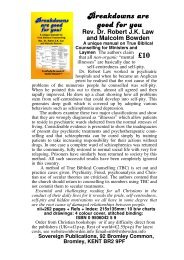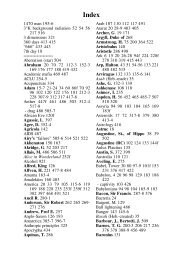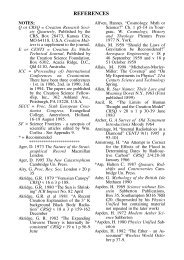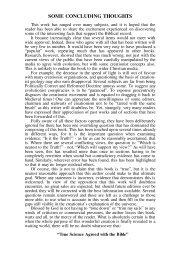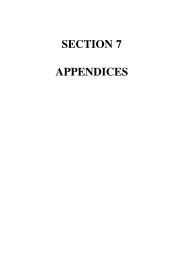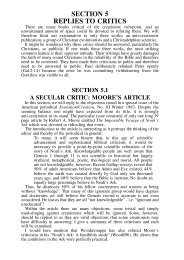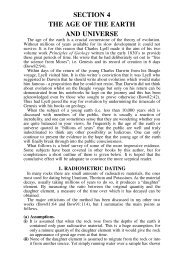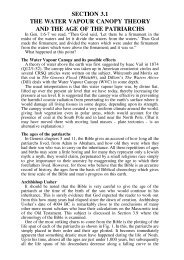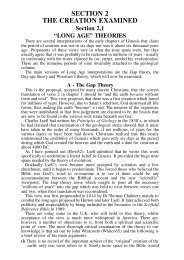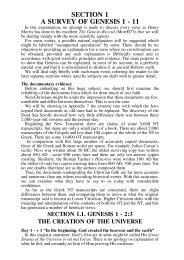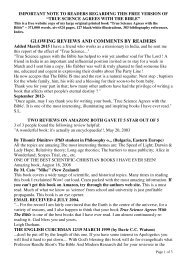TSAWTB Section 6 - Interlude - A Miscellany of Items
True Science Agrees with the Bible, Section 6 - Interlude - A Miscellany of Items (pp. 250-288)
True Science Agrees with the Bible, Section 6 - Interlude - A Miscellany of Items (pp. 250-288)
You also want an ePaper? Increase the reach of your titles
YUMPU automatically turns print PDFs into web optimized ePapers that Google loves.
282 <strong>Section</strong> 6 - <strong>Interlude</strong><br />
1. Lewis refers to Freud’s claim that “all thoughts are due to complexes”.<br />
The illogicality <strong>of</strong> this is that Freud clearly assumes that his statement is true<br />
and is not due to any complex he has! He is effectively saying he is the only<br />
person who is free <strong>of</strong> complexes - a doubtful proposition indeed.<br />
2. Lewis similarly shows that Marx’s claim that all thoughts stem from<br />
class-conditioning is illogical. Marx infers that only his thinking is a true<br />
statement and is free <strong>of</strong> class bias. With his deceptive philosophy and<br />
impoverished background, his writings are full <strong>of</strong> bitter envy <strong>of</strong> those who<br />
have property and a secure position in life. He is just as class-conditioned as<br />
everyone else; in fact even more so.<br />
3. The Rationalist philosopher Hume concluded that it is only reasonable to<br />
believe in God, but as we know that God does not exist, therefore human<br />
reason cannot be trusted.<br />
His error is that pointed out by Lewis; he is excluding from his<br />
generalisation the very statement that he is making which is a rational<br />
deduction. In claiming that his reasoning is true, he is effectively disallowing<br />
everybody else’s but making his rational statement the sole point <strong>of</strong> reference<br />
in the universe.<br />
Hume never extended his arguments to propose what could be used as a<br />
final authority in men’s lives, but left the whole subject “in the air”. He<br />
thereby betrayed his lack <strong>of</strong> rationalist rigour, for had he done so, he knew<br />
that he would have destroyed the whole basis <strong>of</strong> his viewpoint. In fact, he hid<br />
the weaknesses <strong>of</strong> his case under a mass <strong>of</strong> convoluted arguments.<br />
So poor was Hume’s case that Paley had no difficulty in demolishing it in<br />
his Natural Theology. This book was a bastion <strong>of</strong> strength <strong>of</strong> the Christian<br />
faith. It went through 18 editions and was required reading at Cambridge<br />
University until 1922. As we know, Darwin, when studying to be an Anglican<br />
minister, delighted in the clarity <strong>of</strong> his writing and learned by heart many <strong>of</strong><br />
the logical arguments he set out in support <strong>of</strong> the Christian viewpoint. With<br />
so many thousands <strong>of</strong> copies having been printed, it is strange that now it is<br />
almost impossible to obtain a second-hand copy. What, one wonders, could<br />
have happened to them all?<br />
This lack has now been filled by Bill Cooper’s The Sighted Watchmaker<br />
(Coo97) which is a reprint <strong>of</strong> this classic with minor clarifications and<br />
modernisations. The title is a riposte to Dawkins’s The Blind Watchmaker.<br />
4. There is the argument that “All religions ultimately lead to God.” What is<br />
ignored is that all religions claim they have an exclusive path to God, and that<br />
they are the “only true way”. With them all claiming that only they have the<br />
right way to god, it is possible that none <strong>of</strong> them are correct, or that one, and<br />
only one, might be correct in its claim - all others must then be false. What is<br />
certain is that they cannot all be correct, and therefore the statement is false.<br />
In addition, it is not only false, it is misleading, for it gives a veneer <strong>of</strong><br />
respectability to all other religions and deceives non-Christians into believing<br />
they will eventually enter heaven.<br />
There is the opposite argument used that “It is unacceptable that Christianity<br />
rejects all other faiths. It must be more tolerant <strong>of</strong> them.”<br />
The illogicality here should be obvious. Before reading further, we suggest<br />
that you pause here, examine the sentence and see if you can see what it is.<br />
******************<br />
The answer? The speaker is insisting that Christians should be more<br />
tolerant, but he himself in intolerant <strong>of</strong> the Christian position. If he is wanting<br />
the Christian to be more tolerant, then he should be more tolerant <strong>of</strong> the



